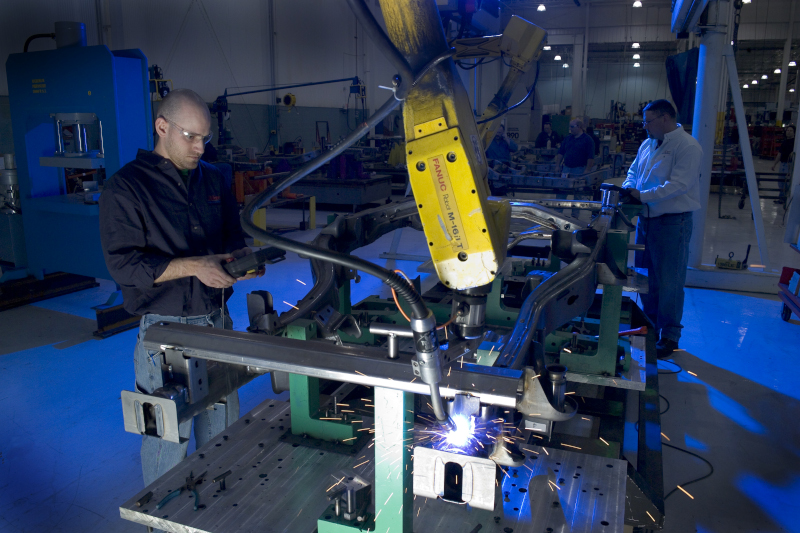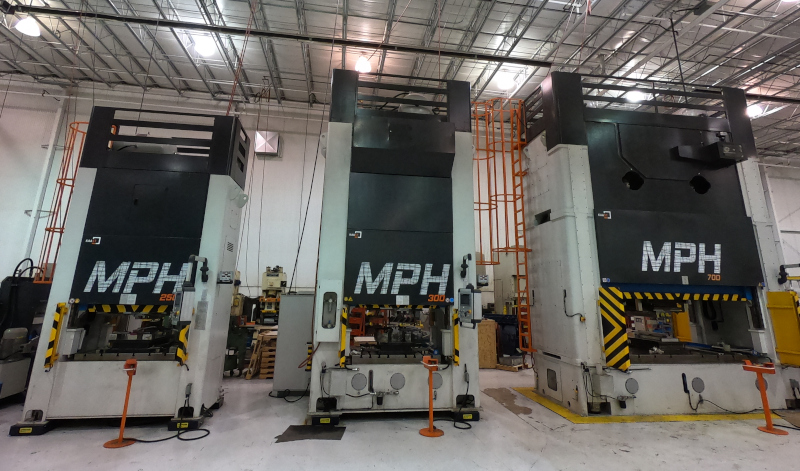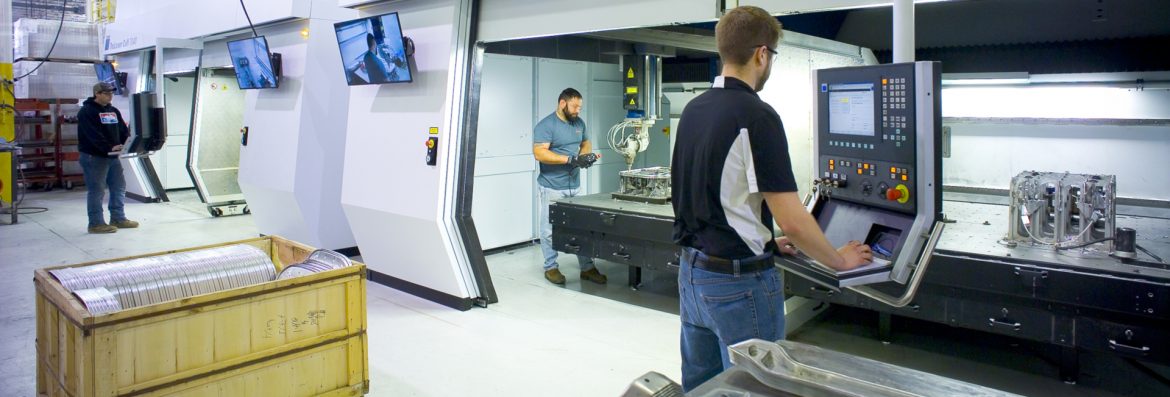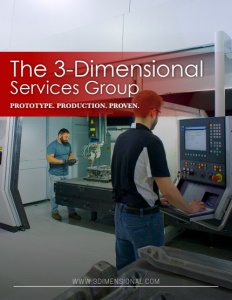The 3-Dimensional Services Group
Prototype. Production. Proven.
Business View Magazine interviews Chad Peterson, GM of the 3-Dimensional Services Group as part of our focus on best practices in the manufacturing sector.
The 3-Dimensional Services Group, headquartered in Rochester Hills, Michigan, was founded in 1992 by Douglas L. Peterson. The family-owned firm began as a single manufacturing facility that was strictly focused on prototype development manufacturing, but over the years, the Group has expanded its competencies and operations to include the manufacturing of low-to-medium volume production parts, with capabilities that include virtually all manufacturing processes. These competencies include: CNC machining, traditional and hot stamping, laser cutting and welding, plastic injection molding, robotic MIG and spot welding, waterjet, tubular hydroforming, CNC tube bending, vibration welding, casting and pattern fabrication, reactionary injection molding (RIM), SLA and SLS rapid prototyping, among others.
Today, the Group consists of several divisions: 3-Dimensional Services, Urgent Plastic Services, Urgent Design & Manufacturing, Michigan Integrated Technologies, and 3-Dimensional Services Europe. “We’ve grown from a very small, family-run business to a mid-sized family-run business,” says General Manager, Chad Peterson. “Currently, we have three manufacturing locations with over 300,000 square feet of manufacturing space, and we have a fourth facility for material processing and warehousing. We also have a sales and engineering office in Bad Homburg, Germany, to better support European markets and our customer base there. We have just over 400 employees,”

“We are heavily involved in the automotive industry, with up to 90 percent of our workload at any given time being automotive related applications,” Peterson continues. “We service many other industries, as well, including aerospace, lawn and garden, power equipment, defense, home appliances, medical device technology, semiconductor processing technology – virtually anything where a customer can provide us with a CAD file and drawing, we are able to support their manufacturing needs. There’s very little that we’re unable to manufacture. We preform a significant amount of metal stamping work as well as robotic welding to create complex weldments from the stamped components we are producing. Those two competencies comprise a significant portion of our revenue. Additional sources of revenue include plastic injection molding and cast/precision machined components.”
In a very competitive sector, Peterson relates the company’s advantages. “One, and perhaps the most important, is our personnel,” he states. “They are a very dedicated and experienced team. Everybody is very passionate about what they are doing and even those who founded the company are still involved. We’ve learned a lot of lessons over the years and our younger team members have had great mentorship from those who have been involved in the industry for so long. This is truly our strongest asset. The second is the scope and scale of the equipment and technology that the company possess, which provides us with an immense amount of manufacturing capacity to support our customer base. Ownership has always been very good about acquiring the latest technology and the newest equipment – things to keep us on the cutting edge of our industry. Those two things, coupled together, are our greatest competitive advantages.”
The Group’s equipment includes over 75 high precision CNC machines; 100-plus stamping presses, 11 of which are 1,000-ton capacity or greater, up to 5000 tons; 30-plus laser cutting cells; 3 fiber laser welding cells; 23 robotic MIG welding cells; a full metallurgical lab used for weld macrographic examination and metallurgical analysis; a fully robotic hot stamping cell that is able to access 2 presses; 15 plastic injection molding presses with up to 850-ton capacity; and a tubular hydroforming cell.
“Additionally,” Peterson states, “we make significant investments in our inspection and quality departments with various laser scanning technologies and advanced coordinate measurement machines to ensure that our customers are delivered the absolute highest quality products, while meeting their urgent timing needs. We continuously invest in next-generation manufacturing equipment, software, and technologies to improve our processes, capabilities, and efficiencies, both internally and for our customers. With an average of $6 million in capital investments over each of the past 5 years, we continue to ensure that we position ourselves as an elite manufacturing source.”

Going forward, Peterson says that the company will begin to focus more on body and white (BIW) structure work for the automotive industry, and is planning to acquire some robotic spot-welding systems for that specific purpose. Additionally, the company recently earned AS 9100:2016 certification which will enable further growth into the aviation, space and defense markets. “The automotive industry is ever-changing,” he notes. “Some of these electric or autonomous vehicles are changing the way the car companies are launching their products. The volumes are very insignificant compared to the typical vehicle platforms that the OEM’s are bringing to market, so they have to change the way that they function and release these programs to get them to market. The volumes for these types of projects are comparatively small with unproven demand and not something that the typical supply base is interested in supporting; they can’t use their traditional tooling strategies, and that is one of the aspects of the market that our company is able to take advantage of. Understanding this fact, we have positioned ourselves to be able to support these types of low-volume production applications, implementing cost-effective tooling strategies that can be scaled as production volumes increase due to consumer demand. That’s really the focus of our company, moving forward, and one of our largest opportunities for growth is to take advantage of this aspect of the market.”
For its raw materials, 3-Dimensional Services works with a number of suppliers, globally. “We recently partnered with United States Steel Corporation (U.S Steel) on development projects to help them understand the strengths and limitations of some of their new Gen 3 steels, producing parts for their OEM customers to trial for potential implementation future vehicle platforms” Peterson recounts. “We have a similar relationship with Tata Steel as well, we’ve been working closely with them, producing parts from their materials, at times in applications that they were previously not used in. They are highly-engineered, advanced high-strength steels (AHSS) that are becoming increasingly prevalent in the market, now. We have been producing parts from these materials to help them better understand what can be achieved with them, and to help automotive OEMs to understand where they can be utilized in their vehicles and what the benefits are compared to materials that have been on the market for a number of years.”
As is the case with many manufacturers, today, Peterson admits that one of the current challenges faced by the 3-Dimensional Services Group is finding skilled tradespeople. “But we’ve been fortunate to find some younger people that are very driven and we develop them,” he maintains. “So, it’s not strictly somebody that’s coming from an engineering background and went to school for this. A lot of times we find people who have a great work ethic, great drive, willingness to learn, and then, we will train them in our processes and the way our company functions to get them up to speed. We have had great success in having employees with a lot of longevity in our company. The vast majority of our employees have been working with us for ten years or more. So, while it is incredibly challenging, we’re trying to break the norm in how we find talent. Another great resource for us is working with technical schools – finding some people that are coming from engineering backgrounds; we’ll bring them in, and develop them for our organization.”
In the end, Peterson claims that even though the company has grown substantially since its inception, it still retains a family-like culture. “We are a very close-knit group,” he avers. “Our employees truly make us the company that we are and the key to our success is our incredibly talented and dedicated workforce. We are very blessed to have the best equipment and facilities, but without our core team and our employees, we would be nothing. So, it’s very important to give the appreciation to our team because as great as our management staff might be, we are nothing without the manufacturing team that make it happen on a daily basis. The different industries and applications that we support provide a variety of challenges that force us to apply our collective knowledge and experience in order to meet the ever-changing demands of our customer base. This fact has cemented our reputation as one of the most trusted and capable resources in the manufacturing industry.”
AT A GLANCE
WHO: The 3-Dimensional Services Group
WHAT: A prototype and low volume manufacturer
WHERE: Rochester Hills, Michigan
WEBSITE: www.3dimensional.com



